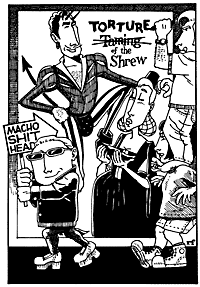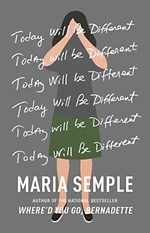Ripping the Shrew
The Rude Mechanicals Tear Into Shakespeare
By Adrienne Martini, Fri., Aug. 15, 1997
|
|
Kate: I am ashamed that women are so simple
To offer war where they should kneel for peace,
Or seek for rule, supremacy and sway,
When they are bound to serve, love and obey.
Austin Chronicle: Why Taming of the Shrew? How did this whole thing begin?
Shawn Sides, director: Taming of the Shrew has been bubbling under the surface for a long time for me. I once had a professor -- a little anecdote -- we were discussing the play and discussing the play, this was in 1988, and nobody ever brought up the sexism at all. We talked about Kate's journey and on and on. Toward the end, I just said, "Well, should we discuss the sexism at all? Does anybody want to mention it?" The professor turned to me and said, "What sexism? I don't know what you're talking about." And went on.
I don't know if he was trying to teach me about irony or if it was something about the Elizabethan world view. I don't know why, but ever since then I've had this desire to do this play. Because all the versions I've ever seen make Petruchio a nice guy who just wants to teach Katherine to play, and they really are attracted to each other. It seems that everyone wants to rescue the play from being what it is.
AC: How did the development process start?
Sides: We read Taming of the Shrew approximately once a week; I asked the actors to bring in outside texts and to work not only thematically, you know, with sort of women's issues-oriented texts, but anything that resonated with them. If that makes you think of this poem, bring that in. We started gathering texts. Kirk largely found places in Shrew where they fit and I asked him to have a narrator who started each scene.
Petruchio: I will be master of what is mine own.
She is my goods, my chattels; she is my house,
My household-stuff, my field, my barn,
My horse, my ox, my ass, my anything.
George Bernard Shaw, 1897: No man with any decency of feeling can sit it [Taming of the Shrew] out in the company of a woman without being extremely ashamed of the lord-of-creation moral implied in the wager and the speech put into the woman's own mouth.
Kirk Lynn, playwright: There's all of this pussy-footing around. Maybe they fall in love. Maybe they're really just playing, he really loves her and he's not just kicking the shit out of her. There's also this withholding food and withholding sleep, really fucking with her, negating everything she says. It's basically torture.
Anonymous: Writing about music is like dancing about architecture.
AC: How do you describe your play to people?
Sides: I usually go for collage. People get that.
Sarah Richardson, actor: I think that it's important that people understand that they're not coming to see Taming of the Shrew. They are coming to see Taming of the Shrew put through about 35 different lenses, people's feelings about Taming of the Shrew, people's feelings about anything that Taming of the Shrew might be about.
Sides: People's feelings that weren't connected to Taming of the Shrew at all.
AC: What do you mean when you say collage?
Sides: I mean that you have one thing that's the background -- which is in this case Taming of the Shrew -- the skeleton, and you put other things on it in ways that bump against each other. Rather than having something that builds a segue, is nice and is linear, you have things that don't go together so you see them better.
Lynn: Which is sometimes fun and sometimes scary.
AC: Why is this important to this piece?
Sides: Because it's what I like. I like the Wooster Group, for example, love to go see their plays. I like the style of Ann Bogart's work; she works in a collage sort of way. I think all of these people are using a classic text or a modern classic so that there's something people are familiar with and latch onto, and then putting all kinds of things around it.
American Heritage dictionary: collage, n. an artistic composition of materials and objects pasted over a surface.
Kate: Come, come, you froward and unable worms,
My mind hath been as big as one of yours,
My heart as great, my reason haply more,
To bandy word for word and frown for frown.
AC: Kirk, how has that process been for you?
Lynn: Slightly infuriating, frankly. It's been difficult for a lot of reasons. It wasn't like writing something because there were so many other voices in hand. Oftentimes I would come up with these brilliant ideas [everyone laughs] that wouldn't be workable, that would take the piece in a direction that Shawn didn't want to go. But I like the script a whole lot. I think having people's personal pieces, the personal narratives, are great and incredible. They'd come in from all over, so it was hard to master and fit them in. It wasn't like you could have a master plan and say this is how it's going to be. So, people would write these personal narratives and while they were great and incredible, it was hard to find a place to place them. It was all the problems with editing, except with 20 writers.
Severin and Tankard, communication theorists: Any statement is to some degree a statement about the speaker and is thus subjective. The best way to overcome the problem of subjectivity is to stick to verifiable statements, or reports.
Sides: You balked at first.
Gavin Mundy, actor: For all sorts of different reasons. And I'm still balking.
Sides: And will be until opening night.
Lynn: He just wanted clarification.
Sides: "Why exactly is he pointing there? There's no window there." It's theatre, Gavin. It's magic.
American Heritage dictionary: montage, n. 2. a rapid succession of scenes or images, as in a movie, that exhibits different aspects of the same idea or situation.
Lynn: One of the things I've liked as well has been the difficulty of the whole process, and I think it merges well with Rude Mechanicals, because we're a collective and everything is always difficult. We always argue everything out instead of having somebody be artistic director and decide. This play is exactly like that. Everybody gets a voice. Everybody has ideas. It's a real pain in the ass, but that's what has caused that texture: 20 people with ideas and opinions.
Vision Statement: Rude Mechanicals is a locally grown crew of patches who collectively create and produce work that plays wild, digs deep, and gives back. We are a debtor's theatre, theatre for the hungry. We don't want people to just observe art, but to sit in it, drink it, smoke it, read it in the newspaper, check the weather report for it, and turn around and tell the person behind them.
AC: What is Rude Mechanicals?
Richardson: Oh dear. We started Rude Mechanicals just over a year ago, June of last year. Shawn wasn't here at the time, but we always conceived of this organization with her. We just didn't have the opportunity to lure her back until recently. I think all of us were interested in producing our own theatre. We were inspired by Kirk's writing and wanted to produce a lot of Kirk's plays. We all come from slightly different backgrounds. Kirk and Lana Lesley had gone to New York and had been produced up there. They had really busted their asses and were really tired of it. It was really expensive to live in New York and they were burned out. I was in New York for a while, then out in L.A. I've always worked in professional theatre but was really kind of tired and disillusioned and saddened by a lot of the traditional hierarchy in the theatre. So we all wanted to be in Austin. And we all wanted to bring our life and our love and our work here. About a year ago, we decided to do it officially and launched it with Kirk's play Pale Idiot.
A lot of the people in the company and a lot of the people who work with the company have a longtime association with Shakespeare at Winedale. Shakespeare is not new to this group of people. A long time ago, we probably thought that this would be a Shakespeare company. To us, The Taming of the Shrew is a natural crossroads of a lot of our backgrounds. Since that time we've become a lot more interested in, if we're going to do Shakespeare or the classics, looking at it in this kind of way. Really ripping it apart.
Mission Statement: Rude Mechanicals is committed to fostering experimental new works by Austin theatre artists and to presenting rebellious re-workings of the classics for fearless Austin audiences. We believe in theatre that invites debate -- that is as intellectually challenging as it is entertaining. Our goal is to realize a truly collaborative company that defies traditional theatrical hierarchies and inspires a more inclusive attitude toward theatre arts.
Lynda E. Boose, scholar: Woman-battering, although not part of Shakespeare's script, repeatedly leaks back in from the margins and turns up in subsequent productions and adaptations (including, for instance, the Burton-Taylor film version, to which director Franco Zeffirelli added a spanking scene).
AC: So what does the whole piece mean?
Mundy: It doesn't mean anything. Just thought I'd say that.
Sides: I think however many people come to see it, that's how many answers there are as to what it means. I'm really into the philosophy that even if something seems to have a really clear meaning, everybody will get their own meaning from it anyway.
I can just tell you the things that it is about, but it doesn't mean that "Women are oppressed" or "Taming of the Shrew is a bad play" or "We're living in very scary times."
Lynn: I wish it did. I like that. Let's do that play next.
Sides: It's about the play The Taming of the Shrew. It's about women's roles and men's roles in our culture. It's about media and marketing.
Mundy: On some level, it's about the actor and the character that's created on the stage, that area that exists between the two.
Richardson: Our own names are used in this play. It's very much about us and Shawn and how we intersected with this material and what role we played within it. So there's a very undisguised theatricality in it. We are the players, we accept the roles and play them out for you, but we stay present all of the time because we have a personal stake in this. We're not under Equity contract being paid $525 a week.
The Facts-on-File Dictionary of the Theatre: Taming of the Shrew, The. A comedy by William Shakespeare, written c. 1593. First performance: date unknown. Ostensibly a comedy of love and marriage, the play comments, through the enforced subservience of Katherina (the "Shrew") by Petruchio, upon the role of women in society. Features of the play include the device of a play within a play and Katherina's final speech on the subject of marital obedience.
AC: So what is the one question that you wish that I had asked?
Lynn: Would you like a cigarette?
Richardson: How much should I write the check for?
Kate: But now I see our lances are but straws,
Our strength as weak, our weakness past compare,
That seeming to be most which we indeed least are.
Then vail your stomachs, for it is no boot,
And place your hands below your husband's foot.
curst & Shrewd: The Taming of the Shrew Unhinged runs Aug 14-Sep 6, Thu-Sat, 8pm, at Hyde Park Theatre, 511 W. 43rd. Call 474-8660 for info.









